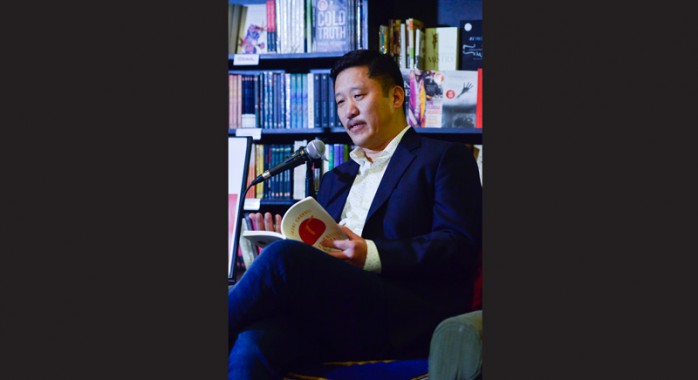




















Sunday, Mar 08, 2020 15:15 [IST]
Last Update: Sunday, Mar 08, 2020 09:40 [IST]
Folk tales are ancient storiesorally passed down through generations, restricted to and accepted by a particular community or a region – but unheard in the outside world. That is, till internet shrunk and our legends and myths became Google-accessible in our smartphones for our lifeless reading.
But where is the enchanted spell of a folk tale – a mystifying piece in itself – without being subscribed to in the oral storytelling tradition?
Curatingan interest is an art form, requires patienceand resilience, as expressed by poet Tashi Chophel in his newly launched ‘How To Collect A Folk Tale’ poem collection. The title poem narrates the humility one must possess and the remoteness that lies ahead in his quest for a folk tale…
Always start the journey
By a river crossing
Or treading gingerly across a major landslide
It gives the feeling of an epic quest…, reads the opening lines of ‘How To Collect A Folk Tale’
Be thankful for what little they have to give
And offer them the bottle you have brought along
Perhaps they’ll be generous and let you in on a village secret
That you have only heard in whispers, is the poem’s denouement.
The four stanzas in between (to read that, get the book) forewarn a collector where the danger and complicities lie in the quest for a folk tale from the original source matter.
In a poetic manner, Tashi Chophel has stripped off the regimented structure and academic folderols that accompanies a ‘project report’ on folk tales and its origins. He tells you in a direct manner, perhaps it may be because he has lived to tell the tale of his quest. It definitely is through his experiences of 18 years as a civil servant which took him to remote corners of the Himalayan State of Sikkim, and inevitably to some strange stories.
BEYOND GANGTOK…
The 45-year-old debuted into the publishing world on a Palindrome day 20-02-2020 with the launch of poem collection ‘How To Collect A Folk Tale’ at Rachna Books, Development Area, Gangtok. The book is published by Rachna Books & Publications.
The collection of over 50 poems was written over a period of 15 years and went simultaneously with his government career.
Chophel considers himself fortunate that his government service career, which started in 2002 as Under-Secretary, took him outside his home town of Gangtok. So far in his 18 years of government service, he has spent 12 years in the other districts of Sikkim.
“Government service has been good for me in the sense that it showed me the villages and I feel fortunate for it. It was like another discovery of Sikkim for me because being Gangtok-raised boys, we have not seen much of the village life. Manyof the poems are from those places. I feel my work has informed my writing,” Chophel tells in conversation with TGIF!
Chophel derives inspiration for his poems from many sources and personal experiences and as said above, from his observation and conversations in bucoliccorners of Sikkim while being posted there. There is this 10-line poem ‘Hearsay’ in his collection that intersects Tashiding hill between a Lepcha fable and modernity.
It is said
The serpent Paril bu will rise
Once more
And squeeze
Tashiding hill
But this time there will be no
Tomorrow
I see a new black road
Snaking up
The hill.
*Paril bu – the serpent responsible for the great deluge in Lepcha myth
*Tashiding – the hill considered the spiritual centre of Sikkim
The collection deals with a diverse array of subjects – vignettes, myths, incidents, slices of life and many of them peppered with humour.
“It could be a beautiful word in a book, it could be a fleeting moment in life or an idea. They kind of stick in your mind and you feel you need to do something with it. So you wait and play around with it till a poem occurs.”
How did poetry come to him? “I don’t know if you remember, there was this magazine called The Gentleman and I came across this special issue on post World War poets, of all the places, in a pan shop in Rangpo which also doubled as a newspaper stall. I was intrigued by many of the poets they covered and I followedup on their work on the internet. I was enthralled with the way they played with everyday words.”
On his influences he says, “The Beat poets had an immediate impact on me, poetry till then verged on the obscure for me, they made it accessible. Pablo Nerudahas to beup there. Discovering European poets like Vasko Popa and Zbiegnew Herbert has been another high. A.K. Ramanujan’s poems, his own and his translations of Bhakti and Sangam poetry were a revelation. Of course Arun Kolatkar’s Jejuri is amongst the best I’ve read, each poem in that collection is a gem. Then there is Keki N Daruwala, Arvind K Mehrotra, Basho, Yehudi Amichai, Shillong poets and you just keep going on. Poetry for me is like going down the rabbit hole, you only keep going deeper.”
On being asked why he prefers poetry to fiction, he says “I know someof the poems would work better in fiction but somehow I gravitated towards the shorter form – I feel it distils the emotional aspect, the ideaI am trying to portray. Secondly, the nature of my work place doesn’t allow me to work on a longer format which requires long hours and patience. Serious writers work up to 10 hours every day, it’s a full time job for them.”
On his writing process, he says “Once in a while, the poem comes out in one go, those are extremely rare moments, but there are poems which have taken him a longer time. The poem ‘The Construct’ took me a full 5 years to write. You start with an idea and you keep working on it till you think you are done.”
THE JOURNEY…
The timeline in Chophel’s debut work starts from the period when he and his friends had started a literary English magazine Catscanned.
“When we came out with the magazine, we wanted to showcase the talents of the region be it in fiction, poetry, non-fiction, comics, photography and even architecture. We managed to come out with two issues which was very well received but the economic aspect of it made us close it down. My poetry starts from that time and I have been thankful that it has stayed with me,” says Chophel.
Asked about balancing work and writing, “I have always given priority to work over my writing because for me work comes first. Yes, that has affected by writing but I have no regrets. I think I have managed to have the best of both worlds,” he says.
Chophel had done a degree in Electrical Engineering from Assam Engineering College, Guwahati and upon return to Gangtok, dabbled in journalism with Weekend Review, an English weekly published from Gangtok.
“The three years in journalism were heady days. Working under the editor Pema Wangchuk was the best learning experience you could ask for. That is where I learnt the importance of a deadline and how to make sure you heard every side of the story. Of course, also how to make a story catchy,” he quips.
Asked the difference between writing structure of a news story, an official noting and a poem, the scribe-bureaucrat-poet mentions: “In a way it is similar as the basic foundation is “Who, What, When and Why” but how you put it across is different. In journalism and bureaucracy the facts are all important but in poetry you are teasing the emotions and the mind.”
So, what motivates him to pick up the pen again and again….
“I don’t think my life would be complete without writing. Everyone needs a passion in life and mine is writing.”
Chophel feels he has completed a full circle as the book has been in collaboration with the designer Karchoong Diyali and publisher Raman Shrestha who were also together during the Catscanned days. “Karchoong is an amazing designer, I have worked with him right from my Weekened Review days. The cover of the book has drawn a lot of buzz and it’s his design.He is a talent that needs to be showcased more.Raman Shrestha is already famous with his bookshop and the events he curates at the bookshop. His foray into publishing is a new chapter that I am looking forward to. He has a line-up of exciting titles that is going to make people sit up and take notice.”
GOOD TIME FOR WRITERS IN SIKKIM…
Chophel mentions that right nowis an exciting time for writers in Sikkim with the breakthrough provided by Prajwal Parajuly and Chetan Shrestha. “Quercus and Speaking Tiger are respected publishers and their works have brought the spotlight to Sikkim. I have to mention the late P.G. Tenzing, who actually was the first to be published by Penguin more than a decade ago, he showed the way. This has been followed by published works from the brilliant poet Guru T. Ladakhi, Parshuram Dahal, Nikhil Pradhan, Ashim Basnet and Pankaj Giri. I know of talents that are out there getting ready with their works.”
Asked what comes immediately to mind when you say Gangtok, Chophel says “Khangchendzonga, TNA, Enchey Gompa, Alu Cheura, the never-ending Jaroand the traffic jam.”
Asked on how he is taking his ‘publishing moment’, Chophel says: “It is exciting! I do feel fulfilled in a way. And I am also pleasantly surprised with the support I am getting from unexpected quarters.”
“It is a good heady feeling butam tentative too because some of the poems are personal and being an introvert and coming out with the book also means I am giving access to myself.”
One such heart stopping personal moment illustrated is the last poem in the book,a slip-second moment that could have turned into a tragedy but passed by harmlessly.
